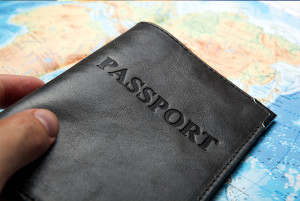A cubicle is a doorless padded cell with post-it notes and pins, but even padded cells have windows. I spent four years and two months in one and I can honestly say I have almost no memory of it - I papered over it with the last six months of travel like wrapping an empty box with a map of the world. I did what millions of people dream of everyday - I said “F*&% it”. Before you roll your eyes - I’m no superhero and I have no mobile talent whatsoever. I can’t even play the spoons. Also, I don’t have rich parents or a trust fund. So read on, fellow plebs.
Everyone gets through a cubicle day by dreaming of being somewhere else. For years I read all about the guy who quit his City job to start a pub in the countryside, or start cooking at their own restaurant or somehow survive through writing a travelblog. My bitter ass had no idea how to cook and no balls to make the move.
I literally spent four years changing my desktop wallpaper to all the places I wanted to go. Jumping out the window, while often considered, was not an option without a parachute. Six months ago I pulled the usual afterwork chute and retreated to the Carpenter’s Arms to fill the growing chasm where my soul used to be with beer. I had a belly to show for it. On that night I wasn’t alone. My friend Sarah who I’d gone to uni with joined me. It started with the usual gripeing - British pub therapy at its best on a rainy night. She had just come back from a four-day holiday in Barcelona. I asked her where she’d stayed and she said it was the apartment of some retired Brit who was back in London. She found it on AirBnB. The hell?
You stayed in a stranger’s house? Yup, and it was brilliant, she told me. I spent the next hour giving her shit. I wasn’t an adventurous person by nature. Eight months ago, the only spice I had ever tried was pepper and spaghetti bolognaise was an exotic meal.
The next day was a rainy hangover lie-in kind of day. The kind of day where the toilet and the kitchen are the only destination. After four hours on Netflix - I had a look at AirBnB and a bunch of articles on what they call ‘sharing economy’ marketplaces. Where at first I saw pinko-communist socialist nonsense, I began to see an opportunity. I started to see a parachute.
By the end of the day, the sky had cleared and I had a plan. The next day I told my boss I was leaving for six months. With only £826.00 in my bank account - I was going to give online marketplaces a go. With no small amount of anxiety and excitement, I gave family-friendly Half Baked farewells to mates at the office. I’ll never forget their faces.
So how did it happen?
Swap your stuff. Before I hit the road with a oneway ticket to Barcelona, I posted by apartment on Trampolinn, which lets you swap your place with places you’re visiting. I was able to find people to swap with for almost the whole period. In total, I saved about £7300.00 by not having to rent in hotels or hostels. I also got some great advice from the folks I was in touch with about what to see and where to go. I had some stuff I didn’t want to fall into the wrong hands, including my Mum’s. Rather than pay for storage, I found a Shoreditch record store on Storemates with loads of extra space. I saved £86.00 doing this instead of using a storage company. I wasn’t taking much in the way of clothes, so I swapped most of my suits for jeans and tshirts I never thought I was cool enough to wear on SnobSwap. I probably saved £208.00 this way.
Don’t buy anything. The sharing economy didn’t just help me get on the road, it also helped me save money and meet people on the road. Apart from all the drunk Brits and Aussies, Spain was a brilliant last stop out of Europe and an introduction to the Arab World. While I was there, Relendo came to the rescue when I met a Canadian girl who wanted to go camping. I rented a tent, gear and cooking equipment for less than £50.00. Along with some maple syrup.
Don’t ride alone. I ended up using Blablacar a lot on the road in central and Eastern Europe. When you ride with someone instead of renting a car the journey becomes about the conversation. You stop being a tourist and start being a local. When you leave a country you’re leaving your story behind as well as taking stories with you.
Don’t eat alone. WithLocals was another great platform I tried. It was mostly expats that I ended up eating with, but it’s often just as interesting to hear their stories about how they wound up there. Found out that others were catching on was well, including one woman selling homemade crafts on NotontheHighStreet. I learned how to cook on the road and by the last few months I never ate a meal alone - or in a restaurant.
Don’t live alone. A cubicle is designed to make you as alone as possible in a room full of people. The sharing economy is designed to let you connect in a place full of individuals. I used marketplaces to start doing things together with strangers. I met a woman using DateMyWardrobe to find clothes and eDivv to trade cosmetics, as well as a mate who sold cricket bats on SidelineSwap. At the end of the day, people my age are just surviving broke and these marketplaces make things easier.

I also earned credit in these marketplaces by using eRated, which let me build up my reputation across all the marketplaces I visited. It was like getting stamped in another passport. Unlike my real passport, I haven’t lost my eRated score.
It was actually sunnyand warm when I finally got back to London. Weighing in at 145lbs and with the standard scraggy beard no one recognized me. I felt like I was still travelling. I went on to eventually quit my job. I’m not sitting on a mountain of travel debt either. Not everything was perfect, I got robbed and my stuff was stolen, but that might have happened anyway. I wouldn’t trade the friendships I made for the stuff I had stolen anyway.











